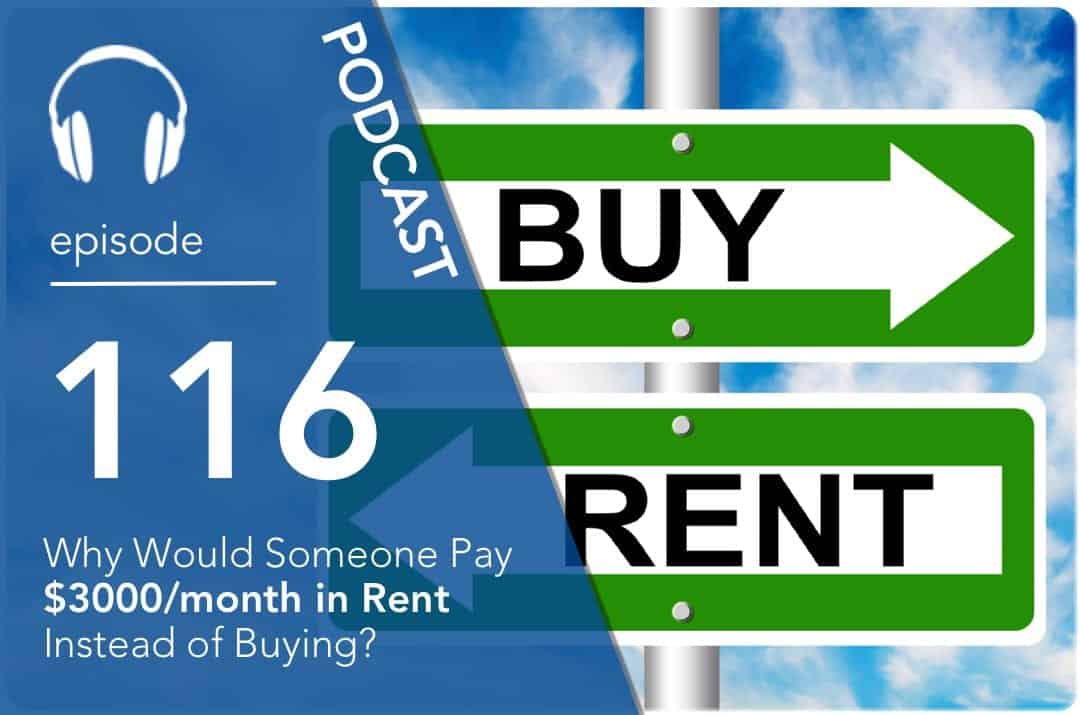Why Would Someone Pay $3000/month in Rent Instead of Buying?

Andrew la Fleur has been advising clients this year to start adding 2 bedroom condos (especially over 800 sq ft) to their portfolio. For the first time ever, larger units are the hottest segment of the condo market. But one investor asked Andrew a great question: why would someone rent one of these units for $3000/month instead of just buying? Andrew will provide 8 reasons why in this episode.
EPISODE HIGHLIGHTS
2:36 Units tend to be rented out based on number of rooms, the functionality of the unit.
3:10 why you should be also looking at purchasing larger two-bedroom units.
7:00 8 reasons why someone would pay $3,000/month in rent.
7:17 Renting is normal in most of the world.
8:48 They don’t have a down payment.
10:43 You can’t get a mortgage.
12:27 Owning is more expensive than renting.
13:55 Most people live paycheck to paycheck.
15:07 They could be starting a business.
16:24 They hate commuting.
17:38 They prefer flexibility and mobility.
Click Here for Interview Transcript
Andrew la Fleur: Why would anyone pay $3,000 a month or more for rent instead of buying? I’ll answer that question on today’s episode. Stay tuned.
Speaker 2: Welcome to the True Condos Podcast with Andrew la Fleur, the place to get the truth on the Toronto condo market and condo investing in Toronto.
Andrew la Fleur: Hi, and welcome back to the show. Thank you again for listening and for your support for the show. I’m hearing more and more people coming to me every week who are finding me through the podcast as opposed to finding the podcast through me, and so thank you very much for listening, Podcast Nation, True Condos Nation, and really appreciate the support of the show. These episodes are going to keep coming. I’m going to keep doing them, and I hope you’re enjoying them.
Again, on today’s episode, in the intro I said I’m going to answer this question that I got from a client just last week. The question is … He said to me, “Why would someone pay $3,000 or even more than $3,000 a month in rent instead of just buying a place?” It seems that when you’re looking at the economics, when you’re reaching those higher levels of rent, people are thinking, “Well, wouldn’t you be better just to buy something instead?”
The reason it’s coming up is because more and more, I am starting to encourage my clients, especially my seasoned investor clients who have a large portfolio of condo units, to start adding two-bedroom units to their portfolio. Now historically, for most of the last decade that I’ve been working with condo investors and investing in condos myself, I have been encouraging my clients to purchase the smallest unit of a given type. That’s my classic rule of thumb that I’ve been teaching for many years when it comes to finding the best unit for investment in a new project, the smallest unit of a given type, so the smaller studios, the smaller one-bedrooms, the smaller one-plus-dens, the smaller two-bedrooms and so on. Those are going to be the best bet for investment.
For the most part, that rule is still a good rule to follow. There’s nothing wrong with that. I don’t think that really is ever going to change. If you’re following that basic rule, you’re always going to do well, because those units are going to give you the best price-to-rent ratio. Why? Again, just to recap this lesson before we get into it, but why is that? Because units tend to be rented out on the number of rooms, the functionality of the unit rather than the size of the unit, so you’re better to buy, for example, a 470-square-foot one-bedroom than a 600-square-foot one-bedroom because they’re going to rent out for about the same, but the 470-square-foot one-bedroom is going to cost significantly less than the 600-square-foot one-bedroom.
Okay. Now that we’ve covered that, why am I starting to say that you should be also looking at purchasing larger two-bedroom units in the 800-square-foot-and-up range to your portfolio? Quite simply because that is where the demand is right now, and that is where the supply shortage is right now in the resale market. We’re seeing across the board this year in 2016 a huge, huge demand and a huge shortage of units, shortage of supply for units both to buy and to rent in the 800, especially in the 800- to 1100-square-foot range of units.
We’re still trying to figure out exactly why that is. Obviously, it’s a combination of things, but I think the two main factors into why this is happening is, one, because quite simply, there were not a lot of these units built in the last five years. Historically over the last five years, builders in new buildings have been putting in fewer and fewer two-bedroom units in general, but more specifically, fewer units over 800 square feet.
Some buildings, entire building, they’ve built … and the largest unit is only maybe 700 or 750 square feet, and so there’s a lot of … Well, not a lot, but there is, you could say, more supply of smaller units available on the market, which is always going to be driven by the first-time-buyer market, but there’s a growing shortage and a huge need for the larger two-bedroom units because there hasn’t been a lot of new product added to the housing supply over the last few years. As these buildings that were sold three, four, five years ago are now being finished, there’s a big gap, in that people who are needing larger spaces are not able to find them, and so we’re seeing bidding wars on the larger condos, which we’ve never seen before. That’s the one thing is just the supply equation.
The other thing is the demand equation, and that is mostly driven by the fact that housing prices have gotten completely out of reach for most people. If you can’t afford a single-family home in Toronto anymore … it’s well over a million dollars … what are you going to do? Next best thing, you’re going to be looking for a family-sized condo, two-bedroom, three-bedroom, two-bedroom-plus-den condo.
Especially over 800 square feet, 900 square feet or so seems to be that sweet spot in the resale market, or buyers and renters are loving that sort of a product where they have two good-sized bedrooms and good, large living area and just space to live, space for two or three or even four people. For a small family to live in a space, they’re going to need at least 800 square feet. That is what’s happening in the market right now. Again, that is why I’m encouraging my investors to start picking up and start adding larger 800- to 1100-square-foot units to their investment portfolio.
I was meeting with one of these clients last week, and the question came up, “Well, how much are these things renting for?” I was saying, “You know, in this case, it’s around $3,000 a month or so.” The client said to me, “Why would anyone pay $3,000 a month in rent? Why wouldn’t they just buy something if they can afford that much rent? It seems to be a high amount for rent.” That is what we are talking about on today’s podcast. It’s been a very long introduction. I apologize, but that is the context for the discussion today.
To answer that question, I want to give you eight reasons why someone would pay $3,000 a month or more in rent instead of just buying. The number-one thing I would like to say is that renting is normal in most of the world. We sometimes have to get out of our North American mindset that somehow we have this bias towards renting that we’ve been trained since birth, those of us from North America and who grew up in North America or who aspire to the North American sort of ideologies, even if you aren’t from here, or even if you aren’t raised here, I should say.
Renting is normal in most of the world, so renting, we have this stigma against it, but just remember that most of the world and most people, renting is not a bad thing. We have to get out of our mindset as North Americans sometimes and step out and realize that not everybody thinks like us. That’s the number-one thing, not everyone thinks like us. It’s a good tip to remember as an investor is your customer, your tenant in your properties in most cases is not the same type of person as you. Just because you think you want to live in a certain way or have a certain type of housing experience doesn’t mean it’s going to be the same for everyone. That’s just a good tip to always keep in mind when you’re buying properties for investment. It really doesn’t matter what you think of the property. It only matters what the person that the property is built for thinks of it, and if it works for them, then it could be a good investment. That’s the first thing.
Number two is why someone would pay 3,000 a month in rent is they don’t have a down payment. Again, if you look at where prices are right now, you need a huge, huge amount of money, cash, in your account to purchase a piece of real estate in this city now. Prices are high. It’s an expensive city. Just an average house in the GTA now is about $750,000, so you need about … For a 20% typical down payment, a traditional down payment, 20% of that is $150,000 in cash.
How many people have $150,000 in cash sitting around? If you’re listening to this podcast, there’s probably a good chance that you do have that kind of money, but, again, that is not who we’re talking about. We were talking about people who rent, and there is a lot of people out there. On top of the $150,000, you probably need about $15,000 for closing costs.
Doesn’t get too much better if you’re looking at buying a condo. The average condo now in the GTA is about pushing $450,000. Again, for the traditional 20% on that, you’re looking at about $88,000, and you’re probably looking at around $8,000 in closing costs in something like that. In either case, you’re looking at a hundred or $150,000 that you need in most cases to purchase a property in Toronto. If you don’t have the down payment, it’s a non-starter. You’re not thinking about purchasing a condo, and so renting is what you’re doing. Then, again, there’s going to be more and more people as prices keep rising, more and more people who are going to be renting.
Okay. Number three is you cannot get a mortgage. Number two is you don’t have a down payment. Number three is you don’t have a mortgage, you can’t get a mortgage. There’s a number of reasons why people cannot necessarily qualify for a mortgage. A very common one is that they’re self-employed, so as they might be earning good money, but they’re self-employed and so they’re not declaring to the CRA that they are earning a significant amount of money. Therefore, the income that they show is lower than the probable actual income that they’re making. Therefore, the banks look at that and they’re not going to give them a mortgage.
A lot of people are in cash businesses, so if you’re in the trades or if you own a small business or restaurant or something like that, again, you might be making a decent living, but if you have a cash business and you’re not showing a lot of income, you’re not going to get a mortgage. Some people are single income. So, yeah, and most people buying are double-income, two-income houses, so couples and families where there’s multiple streams of income coming in, but if you’re supporting a family on a single income, it’s very difficult to get a mortgage, for the most part, in Toronto. Some people just have bad credit, so they might have great income, they might have a great down payment, but if they don’t have good credit, again, you’re not going to get a mortgage. Those are some of the reasons why you might not get a mortgage.
Number-four reason why would somebody pay $3,000 a month in rent or more, reason number four, because they’re doing the math and they’re seeing that for them, owning is more expensive than renting. Maybe you could just squeeze in and buy a place, but you don’t have 20% down payment. If you do the math on most properties in Toronto with, let’s say, 5 or 10% down payment, then the monthly outlay, the monthly cost to live in that property is going to be significantly more than renting in most cases. A lot of people are just looking at that and saying, “Well, my monthly outlay is I’m paying $3,000 a month in rent, but if I were to buy this same property with 5 or 10% down, my monthly outlay would be $4,000 a month in rent.” Then there’s no point.
Now, of course, the equation changes. As we know as investors, a lot of, obviously, the properties that we buy as condo investors and clients of True Condos, they’re all cash-flow positive with 20% down, but if you look at most condos and most properties across Toronto, they are not cash-flow positive with 20% down, so again, doing the math as a renter, and owning can be more expensive than renting.
Number-five reason why somebody might pay $3,000 a month or more in rent, well, simply that, as I say, most people live paycheck to paycheck. Again, if you’re listening to this podcast, you are probably either a condo investor, property investor, or you are on your path to becoming one. You are in the 95th percentile or … Approximately 5% of the population or so will ever become property investors, maybe even less. I’ve seen a statistic on that recently.
Most people are not like us. Most people do not think like we do and do not plan like we do and do not have goals like we have as condo investors. Most people live paycheck to paycheck. Again, that’s something we sometimes forget about. Not everybody is like us, and most people do just live more of a subsistence lifestyle from the day they’re born until the day they die. I’m not saying it’s a good thing, but I’m just saying it is a reality. As long as there are people like that in this world, they will need places to rent, and that’s why we are here as investors to provide them with places to rent.
Number six, they could be starting a business. Actually, this one is one of my tenants who’s renting one of my properties and paying $3,500 a month. Their income is in the six figures. They’re paying me $3,500 a month. That’s a classic case of why wouldn’t that person just buy? In this case, that person is starting a business, and they have allocated and saving capital for a number of years to build this business that they are in the process of starting.
Again, everybody has different priorities, and everybody has different things that they want to do with their money. Not everybody wants to put their money into a house. Some people have different goals and different things that they do with their money, and a common one is starting a business, which can be very expensive. That’s a common thing that we do see with renters in this category, which, by the way, makes them great renters because they are people who plan, they’re people who save, they’re people who understand how to budget. Those are great people to have as tenants.
Number seven is, why they might rent for $3,000 a month or more instead of buying, they hate commuting. What I mean by that is people who are renting condos, especially in the core, they want to be able to walk to work. They want to live the downtown lifestyle. We talk about it a lot. The commuting time is getting worse and worse in the GTA, and more and more people thinking seriously about abandoning the sort of suburban typical lifestyle and living in the city, living smaller and living more simply so that they can enjoy a higher quality of life and they can reclaim hundreds and hundreds of hours every year that they’re just sitting in their cars.
That is certainly a powerful reason and a growing reason to look at owning downtown. In the news again this week, John Tory and City Hall talking about putting tolls now on the Gardiner and the DVP, making commuting even more expensive. Again, it’s just another knock on the traditional model and another boost for the downtown condo market.
The number-eight reason, the eighth and final reason for this episode of why somebody would pay $3,000 or more a month in rent is the people who like to rent, they prefer flexibility and mobility versus ownership, especially the millennial generation. There’s a lot of studies, and articles and things have been written about the millennial generation, who is coming up right now in their 20s and growing in earning power. This generation more than ones before them, one of their core values is having mobility, flexibility, being able to up and move to New York City for a job or take a year off and travel or telecommuting, changing careers and pursuing something in London or Hong Kong or wherever.
Unlike previous generations before them, who really valued stability and security and who were very comfortable with the idea of locking down a mortgage and sort of being chained to that for 25 years, that kind of thinking is completely foreign and not something desired at all by the new generation coming up. Renting obviously provides that flexibility and that mobility where you can live in a place and you can just simply up and leave any time. You don’t have to worry about selling or mortgages or commitments or all the things that come along with home ownership. When you’re renting, it’s certainly a great lifestyle. It’s a carefree sort of life that you’re living, and there’s nothing wrong with that.
That is my list of eight reasons of why someone would pay $3,000 or more to rent a property in Toronto. I hope you enjoyed that episode. I hope you found that helpful, and I hope you will consider … Again, my advice heading into 2017 will still continue to be you want to look at adding more two-bedroom units and especially units over 800 square feet to your portfolio moving forward. We’re going to talk more about this on future episodes and get into more statistics and numbers that back up this idea that I’ve been talking about.
Hope you found this useful, and stay tuned for more episodes. Talk to you soon.
Speaker 2: Thanks for listening to the True Condos Podcast. Remember, your positive reviews make a big difference to the show. To learn more about condo investing, become a True Condo subscriber by visiting truecondos.com.






